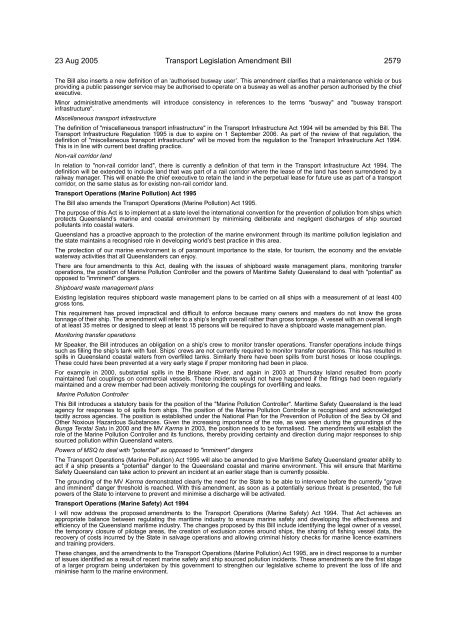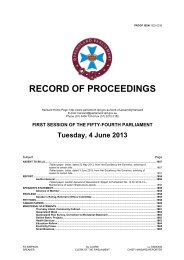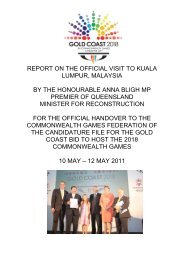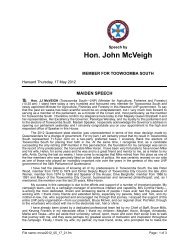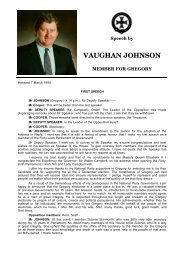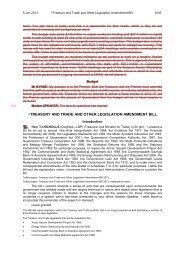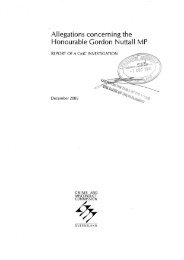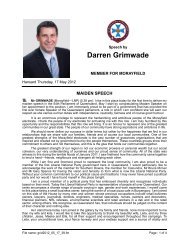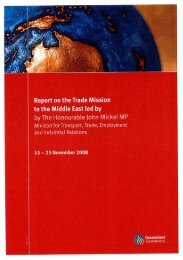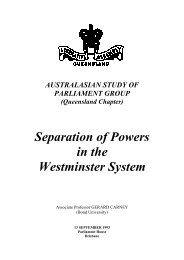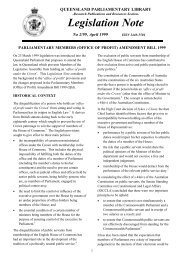weekly hansard - Queensland Parliament - Queensland Government
weekly hansard - Queensland Parliament - Queensland Government
weekly hansard - Queensland Parliament - Queensland Government
Create successful ePaper yourself
Turn your PDF publications into a flip-book with our unique Google optimized e-Paper software.
23 Aug 2005 Transport Legislation Amendment Bill 2579<br />
The Bill also inserts a new definition of an ‘authorised busway user’. This amendment clarifies that a maintenance vehicle or bus<br />
providing a public passenger service may be authorised to operate on a busway as well as another person authorised by the chief<br />
executive.<br />
Minor administrative amendments will introduce consistency in references to the terms "busway" and "busway transport<br />
infrastructure".<br />
Miscellaneous transport infrastructure<br />
The definition of "miscellaneous transport infrastructure" in the Transport Infrastructure Act 1994 will be amended by this Bill. The<br />
Transport Infrastructure Regulation 1995 is due to expire on 1 September 2006. As part of the review of that regulation, the<br />
definition of "miscellaneous transport infrastructure" will be moved from the regulation to the Transport Infrastructure Act 1994.<br />
This is in line with current best drafting practice.<br />
Non-rail corridor land<br />
In relation to "non-rail corridor land", there is currently a definition of that term in the Transport Infrastructure Act 1994. The<br />
definition will be extended to include land that was part of a rail corridor where the lease of the land has been surrendered by a<br />
railway manager. This will enable the chief executive to retain the land in the perpetual lease for future use as part of a transport<br />
corridor, on the same status as for existing non-rail corridor land.<br />
Transport Operations (Marine Pollution) Act 1995<br />
The Bill also amends the Transport Operations (Marine Pollution) Act 1995.<br />
The purpose of this Act is to implement at a state level the international convention for the prevention of pollution from ships which<br />
protects <strong>Queensland</strong>’s marine and coastal environment by minimising deliberate and negligent discharges of ship sourced<br />
pollutants into coastal waters.<br />
<strong>Queensland</strong> has a proactive approach to the protection of the marine environment through its maritime pollution legislation and<br />
the state maintains a recognised role in developing world’s best practice in this area.<br />
The protection of our marine environment is of paramount importance to the state, for tourism, the economy and the enviable<br />
waterway activities that all <strong>Queensland</strong>ers can enjoy.<br />
There are four amendments to this Act, dealing with the issues of shipboard waste management plans, monitoring transfer<br />
operations, the position of Marine Pollution Controller and the powers of Maritime Safety <strong>Queensland</strong> to deal with "potential" as<br />
opposed to "imminent" dangers.<br />
Shipboard waste management plans<br />
Existing legislation requires shipboard waste management plans to be carried on all ships with a measurement of at least 400<br />
gross tons.<br />
This requirement has proved impractical and difficult to enforce because many owners and masters do not know the gross<br />
tonnage of their ship. The amendment will refer to a ship’s length overall rather than gross tonnage. A vessel with an overall length<br />
of at least 35 metres or designed to sleep at least 15 persons will be required to have a shipboard waste management plan.<br />
Monitoring transfer operations<br />
Mr Speaker, the Bill introduces an obligation on a ship’s crew to monitor transfer operations. Transfer operations include things<br />
such as filling the ship’s tank with fuel. Ships’ crews are not currently required to monitor transfer operations. This has resulted in<br />
spills in <strong>Queensland</strong> coastal waters from overfilled tanks. Similarly there have been spills from burst hoses or loose couplings.<br />
These could have been prevented at a very early stage if proper monitoring had been in place.<br />
For example in 2000, substantial spills in the Brisbane River, and again in 2003 at Thursday Island resulted from poorly<br />
maintained fuel couplings on commercial vessels. These incidents would not have happened if the fittings had been regularly<br />
maintained and a crew member had been actively monitoring the couplings for overfilling and leaks.<br />
Marine Pollution Controller<br />
This Bill introduces a statutory basis for the position of the "Marine Pollution Controller". Maritime Safety <strong>Queensland</strong> is the lead<br />
agency for responses to oil spills from ships. The position of the Marine Pollution Controller is recognised and acknowledged<br />
tacitly across agencies. The position is established under the National Plan for the Prevention of Pollution of the Sea by Oil and<br />
Other Noxious Hazardous Substances. Given the increasing importance of the role, as was seen during the groundings of the<br />
Bunga Teratai Satu in 2000 and the MV Karma in 2003, the position needs to be formalised. The amendments will establish the<br />
role of the Marine Pollution Controller and its functions, thereby providing certainty and direction during major responses to ship<br />
sourced pollution within <strong>Queensland</strong> waters.<br />
Powers of MSQ to deal with "potential" as opposed to "imminent" dangers<br />
The Transport Operations (Marine Pollution) Act 1995 will also be amended to give Maritime Safety <strong>Queensland</strong> greater ability to<br />
act if a ship presents a "potential" danger to the <strong>Queensland</strong> coastal and marine environment. This will ensure that Maritime<br />
Safety <strong>Queensland</strong> can take action to prevent an incident at an earlier stage than is currently possible.<br />
The grounding of the MV Karma demonstrated clearly the need for the State to be able to intervene before the currently "grave<br />
and imminent" danger threshold is reached. With this amendment, as soon as a potentially serious threat is presented, the full<br />
powers of the State to intervene to prevent and minimise a discharge will be activated.<br />
Transport Operations (Marine Safety) Act 1994<br />
I will now address the proposed amendments to the Transport Operations (Marine Safety) Act 1994. That Act achieves an<br />
appropriate balance between regulating the maritime industry to ensure marine safety and developing the effectiveness and<br />
efficiency of the <strong>Queensland</strong> maritime industry. The changes proposed by this Bill include identifying the legal owner of a vessel,<br />
the temporary closure of pilotage areas, the creation of exclusion zones around ships, the sharing of fishing vessel data, the<br />
recovery of costs incurred by the State in salvage operations and allowing criminal history checks for marine licence examiners<br />
and training providers.<br />
These changes, and the amendments to the Transport Operations (Marine Pollution) Act 1995, are in direct response to a number<br />
of issues identified as a result of recent marine safety and ship sourced pollution incidents. These amendments are the first stage<br />
of a larger program being undertaken by this government to strengthen our legislative scheme to prevent the loss of life and<br />
minimise harm to the marine environment.


